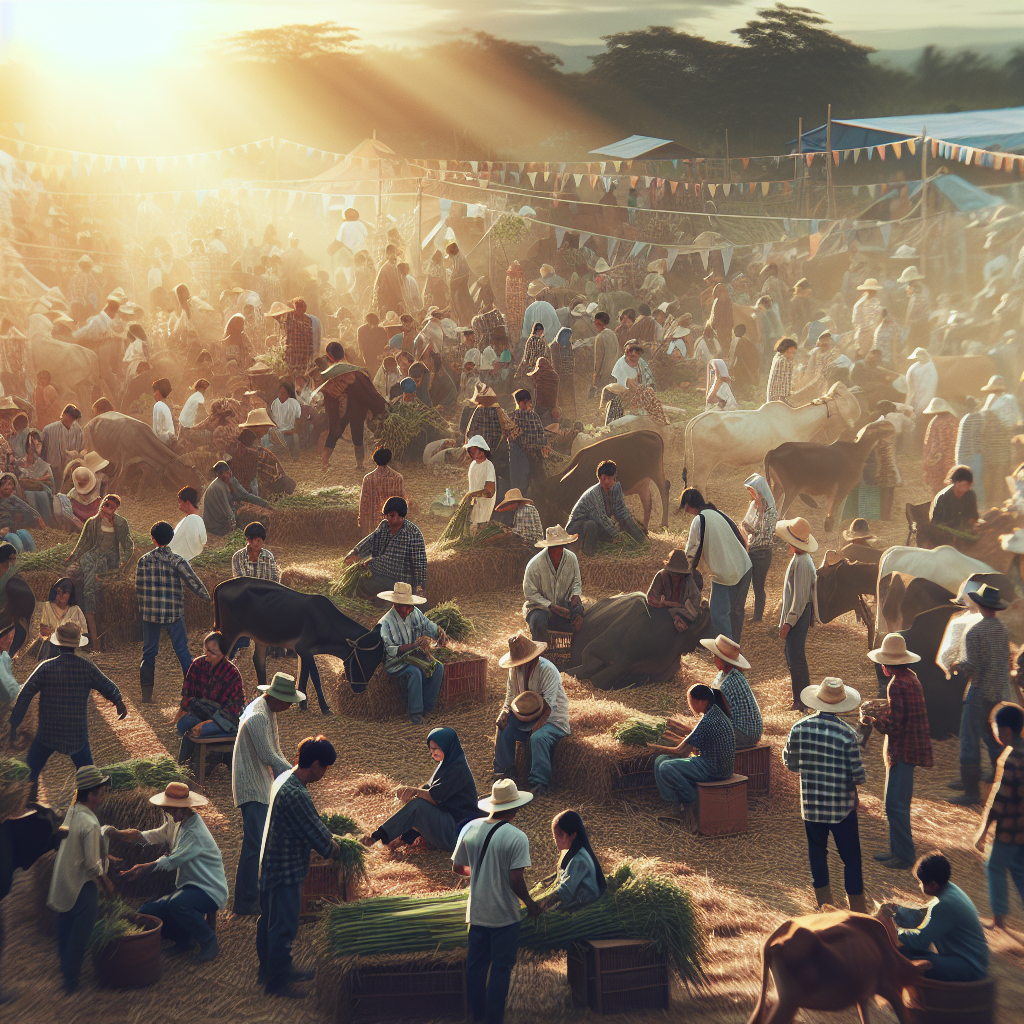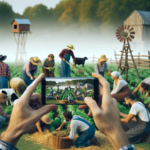Welcoming You to the World of Farm Event Marketing
Have you ever thought about how a simple farm event could be a powerful marketing tool for your business? Believe it or not, your farm is loaded with opportunities to connect with customers, sell more products, and build a stronger presence for your brand.
In this blog post, we will be exploring all you need to know about farm event marketing – from what it is, the types of farm events, their benefits, to key strategies for effective planning and promotion. We’ll also share valuable tips on leveraging social media, ensuring legal compliance, and real-life examples of successful farm event businesses.
Curious to find out more? Let’s get started and unlock the potential of your farm!
Hosting Farm Events for Marketing
What Is Farm Event Marketing?
Farm event marketing involves organizing and hosting events on your farm to attract visitors, customers, and community members. These events can include farm tours, workshops, festivals, and farm-to-table dinners.
They provide a way to showcase your farm’s products, engage with your audience, and build brand awareness.
Types of Farm Events
Different types of events can serve various marketing goals. Here are some ideas:
- Farm Tours: Invite the public to see your farm operations firsthand.
- Workshops: Offer classes on topics like farming techniques, cooking, or gardening.
- Festivals: Host seasonal events such as harvest festivals or spring planting days.
- Farm-to-Table Dinners: Create a dining experience using your farm’s produce.
- Pick-Your-Own: Allow customers to pick their own fruits or vegetables directly from the fields.
Benefits of Hosting Farm Events
Hosting farm events provides multiple benefits for your business:
- Brand Awareness: Events help spread the word about your farm and produce.
- Customer Engagement: Engage directly with your customers and build relationships.
- Sales Opportunities: Increase direct sales by offering products during events.
- Community Building: Strengthen ties with the local community.
- Educational Outreach: Provide education about agriculture and sustainable practices.
Planning and Promoting Your Event
Effective event planning requires attention to detail and strong marketing efforts. Consider these steps:
| Step | Description |
|---|---|
| 1. Define Objectives | Determine what you aim to achieve with the event. |
| 2. Set a Budget | Establish financial parameters to guide your planning. |
| 3. Choose a Date | Select a date and time that works for your audience. |
| 4. Promote the Event | Use social media, email marketing, and local media to spread the word. |
| 5. Plan Logistics | Organize food, activities, and necessary materials. |
| 6. Evaluate | Gather feedback and assess the event’s success. |
Leveraging Social Media
Social media is a powerful tool for promoting your farm events. Here’s how to make the most of it:
- Create Event Pages: Platforms like Facebook allow you to create dedicated event pages.
- Post Regular Updates: Keep your audience engaged with regular updates and sneak peeks.
- Utilize Hashtags: Use relevant hashtags to increase event visibility.
- Share Live Updates: Use live streaming or stories to share real-time updates during the event.
- Encourage User-Generated Content: Ask attendees to share their experiences and tag your farm.
Legal Considerations
Before hosting an event, ensure compliance with local regulations and insurance requirements.
Check if you need permits for hosting large gatherings and consider liability insurance to protect against potential risks.
Real-Life Examples
Many farms have successfully used events to boost their marketing. For example, PickYourOwn.org lists various farms that host pumpkin patches and corn mazes, drawing numerous visitors each year.
These events not only attract visitors but also generate additional revenue through activity fees and product sales.
Expanding the Event Scope for Farm Marketing
Collaborating with Local Businesses
In addition to hosting standalone events, consider collaborating with local businesses to enrich your offerings. Partnerships can amplify your reach and provide mutual benefits. For instance:
- Local Restaurateurs: Invite chefs from local restaurants to prepare dishes using your farm produce for special meals, enhancing the farm-to-table dining experience.
- Wineries or Craft Breweries: Collaborate for wine and beer tasting events to pair their beverages with your produce.
- Artists and Crafters: Organize artisanal workshops where participants can learn various crafts whilst enjoying the farm ambiance.
Integrating eCommerce
Implementing eCommerce can further leverage your farm events as a marketing strategy. Options include:
- Online Ticket Sales: Simplify access to your event by allowing pre-event ticket purchases online.
- Virtual Farm Shop: A website where visitors can buy your farm produce, sourced directly or as added value products, extending your reach beyond the event attendees.
- Online Booking for Workshops: Offer the convenience of online reservations for workshops or other limited-capacity activities.
Developing a Loyalty Program
Building a loyalty program encourages repeat visits and strengthens relationships with your clientele. Examples include:
- Membership Benefits: Offer annual memberships that provide perks such as free access to paid events, discounts on products, or early bird access to tickets.
- Frequent Visitor Awards: Reward frequent event attendees with unique farm experiences or exclusive products.
- Referral Rewards: Offer incentives for attendees who bring in new visitors or share your events on social media.
Incorporating Farm History and Culture
Your farm’s history and culture can contribute to a distinctive, engaging event atmosphere. Actionable ideas are:
- Historic Tours: Besides showing current operations, share your farm’s history, its founding, significant events, or famous farm residents. This creates a deeper connection with the public.
- Cultural Celebrations: Celebrate occasions relevant to your farm’s culture. For instance, if your farm has Scottish origins, host a Highland games event.
Involving Community Groups
Involving local community groups such as schools, youth organizations, or senior clubs allows a wider exposure among demographic groups that might not typically attend farm events.
- School Field Trips: Engage with local schools to host educational field trips that align with their curriculum, like lessons on photosynthesis or farming practices.
- Hobby Club Activities: Partner with gardening, cooking, or bird watching clubs to foster a shared interest in your farm activities.
- Senior Specials: Offer senior-friendly activities, like easy nature walks around the farm or nostalgic storytelling sessions.
Case Study – Apple Hill Farms
Apple Hill, located in the Sierra Nevada near Placerville, CA, is a consortium of over 50 ranches united under one banner. In their marketing strategy, they used various farm events, including U-Pick farms, wineries, and an autumn festival with craft shows and pony rides. This collective ensured year-round visitor engagement, resulting in a successful, sustainable model for the participating farms.
Conclusion
Farm event marketing presents a unique and highly engaging avenue for farms to improve their brand awareness, foster a connection with their audience, and augment their revenues. By curating appealing events such as tours, workshops, festivals, and farm-to-table dinners, farms can offer an immersive and educational experience to their visitors. Partnering with local businesses, integrating ecommerce, instituting a loyalty program, leveraging the farm’s historical and cultural aspects, and involving community groups can further enhance the overall event experience.
By following the model of successful endeavors like Apple Hill Farms, any farm can transform their ordinary operations into extraordinary experiences, paving the way for meaningful relationships with their customers and sustainable growth for their business.
Frequently Asked Questions – FAQs
What is farm event marketing?
Farm event marketing refers to the practice of hosting various events on your farm, like workshops, festivals, or farm-to-table dinners, to attract visitors and drive sales.
What benefits can farms derive from hosting events?
Hosting events can help farms in increasing brand awareness, engaging directly with the customers, providing direct sales opportunities, strengthening ties with the local community, and offering educational insight about farming practices.
How can local businesses contribute to farm events?
Local businesses, such as restaurants, wineries, and craft stores, can be invited to participate during events. This collaboration can enhance the event experience, amplify reach, and provide mutual benefits.
What role does ecommerce play in farm event marketing?
Ecommerce can be integrated into farm event marketing by offering online event tickets, creating a virtual farm shop for direct purchases, or providing online booking for workshops and other activities.
How can farms incorporate their history and culture into events?
Farms can give historic tours sharing key moments from their past, or host cultural celebrations relevant to their origin or practices. Such incorporation can create a unique, engaging atmosphere during events.






